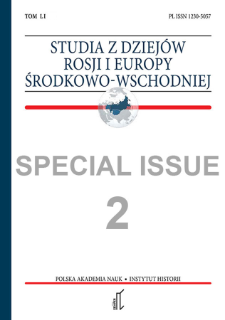
Object
Title: Polish foreign policy and role of the armed forcesin geopolitical considerations of Lieutenant Colonel Tadeusz Zakrzewski addressed to Prime Minister Władysław Sikorski
Subtitle:
Studia z Dziejów Rosji i Europy Środkowo-Wschodniej Vol. 51 no 2 (2016), Special Issue
Contributor:
Institute of History of the Polish Academy of Sciences
Publisher:
Institute of History of the Polish Academy of Sciences
Place of publishing:
Description:
s. 153-169 ; Zawiera aneks źródłowy: Tadeusz Zakrzewski, Mój pogląd na politykę zagraniczną Polski i rolę wojska ; Streszcz. ang., ros.
Type of object:
Abstract:
In January 1943, Commander-in-Chief and Prime Minister of Poland,General Władysław Sikorski, received a memorandum on the objectives of the Polish foreignpolicy drawn up by Lieutenant Colonel Tadeusz Zakrzewski (1897–1964). Zakrzewski believedthat, to ensure Poland’s victory in the war, the government should make use of its three mainadvantages with regard to the governments of the Allied states, the European allies of Germanyand international public opinion. The role of the armed forces was to fight alongside their allies.The nation was expected to mount an active resistance against the Germans and to combatcollaboration with the occupier. The task of propaganda was to spread knowledge about thePolish contributions to the war, as well as to present the Polish proposal for the frameworkfor peace. The expected outcome of these policies was the permanent restoration of the Polishstate within its pre-war borders – with some territorial gains at the expense of Germany – andthe establishment of the Union of Central Europe.
References:
Bułhak H., “Próba czechosłowackich kół wojskowych nawiązania rozmów sojuszniczych z polskim Sztabem Głównym w marcu 1938 r.”, Studia z Dziejów ZSRR i Europy Środkowej, 15 (1979).
Dubicki T., Rostworowski S.J., Sanatorzy kontra Sikorszczycy, czyli walka o władzę na uchodźstwie w Rumunii 1939–1940, Warszawa, 1993.
Dubicki T., Wojsko Polskie w Rumunii w latach 1939–1941, Warszawa, 1994.
Dubicki T., Suchcitz A., Oficerowie wywiadu WP i PSZ w latach 1939–1945, vol. 1, Warszawa, 2009.
Dymarski M., Stosunki wewnętrzne wśród polskiego wychodźstwa politycznego i wojskowego we Francji i Wielkiej Brytanii 1939–1945, Wrocław, 1999.
Historia Dyplomacji Polskiej, vol. 4: 1918–1939, ed. P. Łossowski, Warszawa, 1995.
Historia Dyplomacji Polskiej, vol. 5: 1939–1945, ed. W. Michowicz, Warszawa, 1999. Katelbach T., “Akt pierwszy dramatu”, Zeszyty Historyczne, 7 (1965).
Kowalewski J., “Cykl rumuński”, Zeszyty Historyczne, 6 (1964).
Pobóg-Malinowski W., “Na rumuńskim rozdrożu (fragmenty wspomnień)”, part 3, Kultura, 9–10 (1948).
Pobóg-Malinowski W., Najnowsza historia polityczna Polski (okres 1939–1945), vol. 1, Gdańsk 1990.
Poniński A., “Wrzesień 1939 r. w Rumunii”, Zeszyty Historyczne, 6 (1964).
Relation:
Studia z Dziejów Rosji i Europy Środkowo-Wschodniej
Volume:
Issue:
Start page:
End page:
Detailed Resource Type:
Format:
Resource Identifier:
oai:rcin.org.pl:63978 ; e-ISSN 2353-6403 ; 10.12775/SDR.2016.EN2.06
Source:
Language:
Language of abstract:
Rights:
Licencja Creative Commons Uznanie autorstwa-Bez utworów zależnych 4.0
Terms of use:
Zasób chroniony prawem autorskim. [CC BY-ND 4.0 Międzynarodowe] Korzystanie dozwolone zgodnie z licencją Creative Commons Uznanie autorstwa-Bez utworów zależnych 4.0, której pełne postanowienia dostępne są pod adresem: ; -
Digitizing institution:
Instytut Historii Polskiej Akademii Nauk
Original in:
Biblioteka Instytutu Historii PAN
Projects co-financed by:
Ministra Nauki i Szkolnictwa Wyższego ; Działalność upowszechniająca naukę (DUN)
Access:
Object collections:
- Digital Repository of Scientific Institutes > Partners' collections > Institute of History PAS > Serials
- Digital Repository of Scientific Institutes > Partners' collections > Institute of History PAS > Institute Publications
- Digital Repository of Scientific Institutes > Partners' collections > Institute of History PAS > Institute Publications > Journals
- Digital Repository of Scientific Institutes > Partners' collections > Institute of History PAS > Institute Publications > Journals > Studia z Dziejów Rosji i Europy Środkowo-Wschodniej
- Digital Repository of Scientific Institutes > Literature > Journals/Articles
Last modified:
Sep 22, 2023
In our library since:
Dec 11, 2017
Number of object content downloads / hits:
118
All available object's versions:
https://rcin.org.pl/publication/83542
Show description in RDF format:
Show description in RDFa format:
Show description in OAI-PMH format:
Objects Similar
Miszewski, Dariusz
Miszewski, Dariusz
Kersten, Krystyna (1931–2008)
Stępka, Stanisław

 INSTYTUT ARCHEOLOGII I ETNOLOGII POLSKIEJ AKADEMII NAUK
INSTYTUT ARCHEOLOGII I ETNOLOGII POLSKIEJ AKADEMII NAUK
 INSTYTUT BADAŃ LITERACKICH POLSKIEJ AKADEMII NAUK
INSTYTUT BADAŃ LITERACKICH POLSKIEJ AKADEMII NAUK
 INSTYTUT BADAWCZY LEŚNICTWA
INSTYTUT BADAWCZY LEŚNICTWA
 INSTYTUT BIOLOGII DOŚWIADCZALNEJ IM. MARCELEGO NENCKIEGO POLSKIEJ AKADEMII NAUK
INSTYTUT BIOLOGII DOŚWIADCZALNEJ IM. MARCELEGO NENCKIEGO POLSKIEJ AKADEMII NAUK
 INSTYTUT BIOLOGII SSAKÓW POLSKIEJ AKADEMII NAUK
INSTYTUT BIOLOGII SSAKÓW POLSKIEJ AKADEMII NAUK
 INSTYTUT CHEMII FIZYCZNEJ PAN
INSTYTUT CHEMII FIZYCZNEJ PAN
 INSTYTUT CHEMII ORGANICZNEJ PAN
INSTYTUT CHEMII ORGANICZNEJ PAN
 INSTYTUT FILOZOFII I SOCJOLOGII PAN
INSTYTUT FILOZOFII I SOCJOLOGII PAN
 INSTYTUT GEOGRAFII I PRZESTRZENNEGO ZAGOSPODAROWANIA PAN
INSTYTUT GEOGRAFII I PRZESTRZENNEGO ZAGOSPODAROWANIA PAN
 INSTYTUT HISTORII im. TADEUSZA MANTEUFFLA POLSKIEJ AKADEMII NAUK
INSTYTUT HISTORII im. TADEUSZA MANTEUFFLA POLSKIEJ AKADEMII NAUK
 INSTYTUT JĘZYKA POLSKIEGO POLSKIEJ AKADEMII NAUK
INSTYTUT JĘZYKA POLSKIEGO POLSKIEJ AKADEMII NAUK
 INSTYTUT MATEMATYCZNY PAN
INSTYTUT MATEMATYCZNY PAN
 INSTYTUT MEDYCYNY DOŚWIADCZALNEJ I KLINICZNEJ IM.MIROSŁAWA MOSSAKOWSKIEGO POLSKIEJ AKADEMII NAUK
INSTYTUT MEDYCYNY DOŚWIADCZALNEJ I KLINICZNEJ IM.MIROSŁAWA MOSSAKOWSKIEGO POLSKIEJ AKADEMII NAUK
 INSTYTUT PODSTAWOWYCH PROBLEMÓW TECHNIKI PAN
INSTYTUT PODSTAWOWYCH PROBLEMÓW TECHNIKI PAN
 INSTYTUT SLAWISTYKI PAN
INSTYTUT SLAWISTYKI PAN
 SIEĆ BADAWCZA ŁUKASIEWICZ - INSTYTUT TECHNOLOGII MATERIAŁÓW ELEKTRONICZNYCH
SIEĆ BADAWCZA ŁUKASIEWICZ - INSTYTUT TECHNOLOGII MATERIAŁÓW ELEKTRONICZNYCH
 MUZEUM I INSTYTUT ZOOLOGII POLSKIEJ AKADEMII NAUK
MUZEUM I INSTYTUT ZOOLOGII POLSKIEJ AKADEMII NAUK
 INSTYTUT BADAŃ SYSTEMOWYCH PAN
INSTYTUT BADAŃ SYSTEMOWYCH PAN
 INSTYTUT BOTANIKI IM. WŁADYSŁAWA SZAFERA POLSKIEJ AKADEMII NAUK
INSTYTUT BOTANIKI IM. WŁADYSŁAWA SZAFERA POLSKIEJ AKADEMII NAUK


































